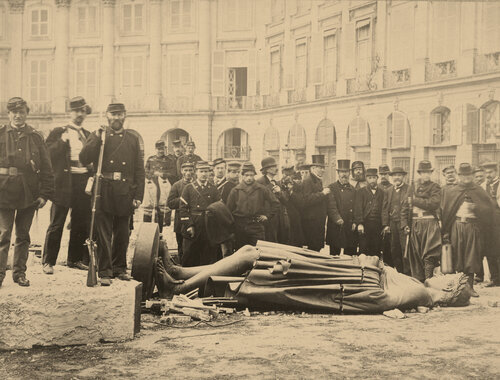On The Poetic Works of John Devlin, Part II
The re-imagining of Christianity among its livelier adherents is as vital as any secular “poetics.”
De la Traducción como Conquista, Parte II
El pasado no desaparece en el presente sino que trona hacia el olvido junto con él. El presente es supuesto por el pasado, incluso si no es el futuro que el pasado tenía en mente.
De la Traducción como Conquista, Parte I
Caesura publica la primera parte del ensayo Traducción como Conquista de Austin Carder traducido al español por Christopher Uribe.
RIP Trump Art
Artists of our generation are so hopeless that they would rather wish for fascism than confront the real challenge of the present.
A Response to Adam Lehrer’s “Art’s Moral Fetish”
What’s objectionable for Lehrer is that the products of the culture industry transmit a comfortable (numbing) attitude towards reality as opposed to an “ambiguous” or “critical” one, which art formerly laid claim to.
Art’s Moral Fetish
The art that casts a critical eye towards our society in its totality, or even just employs ambiguity to inspire criticality in its viewers, is met with skepticism, if not hostility.
Notes on Jon Rafman’s Dream Journal
Art itself doesn’t need to be defended: even when it whispers fake nothings, or indulges suspicious behavior, it speaks more than any defense ever could.
On the Poetic Works of John Devlin, Part I
Devlin’s cover-art, in conjunction with the title and text, suggests to me the situation of the astrologer on earth, whose observations describe the dome of the heavens.
Re-Materialization, Remoteness, and Reverence. A Critique of De-Materialization in Art
If objects — like that dead paintbrush — mean nothing but their functional definition, a human being might well be nothing more than a machine for destroying nature; love, a purely mechanical function.
Notes on Safe Conceptualisms
Conpo replicates the cultural effluvia it poaches with little trace whatsoever, really, of any purposeful détournement.
What does it mean to be critical?
When people today criticize the leaders of the American Revolution they only project their own narrowness and narcissism onto the conditions of the past. Had the American Revolution been defeated, in 1776 or in 1865, there would be no critique of present freedom possible today and no hope for any greater freedom in the future.
The Magnitude of a Young Courbet: Reflections on A Burial at Ornans
According to a young Courbet, whatever we encounter en masse today might just as well need to be considered a (neo-) Romanticism, waiting for its own Burial in order to explode the heteronomy of the given and the same in which we constantly entrench ourselves.
The Touch of Translation
Rather than trying to convey what is seen through a sentence in the original, the translator should replicate the structure of seeing — the syntax — since this structure registers the most elemental sense of the intention behind the original.
Museums and Politics: A History of Disappointments, Part I
Why is it no longer self-evident that museums are valuable to anyone but professional artists, critics, administrators, and scholars? Why are the humanist values embraced by the artists of the Paris Commune now so suspect? Why are we so inclined to protest museums and curators, preening for their attention and permission?
Translation as Conquest, Part IV
Eternity changes Poe’s oeuvre into itself — goes on discovering its truth content — through “a remarkable number of works that derive from it, that are not so much imitations as they are consequences.”
The First Episode: Poetry of the Past — the Future, Part II
As Baudelaire would come to recognize, the language of commodities is the language of correspondances — of the “sympathetic resonance” of the equality of the principle of exchange — and that the strange, spontaneous language of commodities is the lyricism of modern poetry.
Translation as Conquest, Part III
Anyone can only gain by a good translation because a translation acts upon and retroactively transforms the original.
What is the Meaning of This?
Today’s culture and its criticism seem like they are dying to keep the past alive. But to what end? If knowing our past isn’t exactly what we’re doing here, then what are we doing?
Negrophilia and The Black Square
Nobody is going to remember blackout Tuesday. That wasn’t the point. It wasn’t even really an experience, and we won’t learn anything from it.
Ambivalence as a Tool, Part III
In what way does art still point beyond capitalism today? Whether or not contemporary art still has a potential to point beyond the present, is a question we must be willing to ask.




















